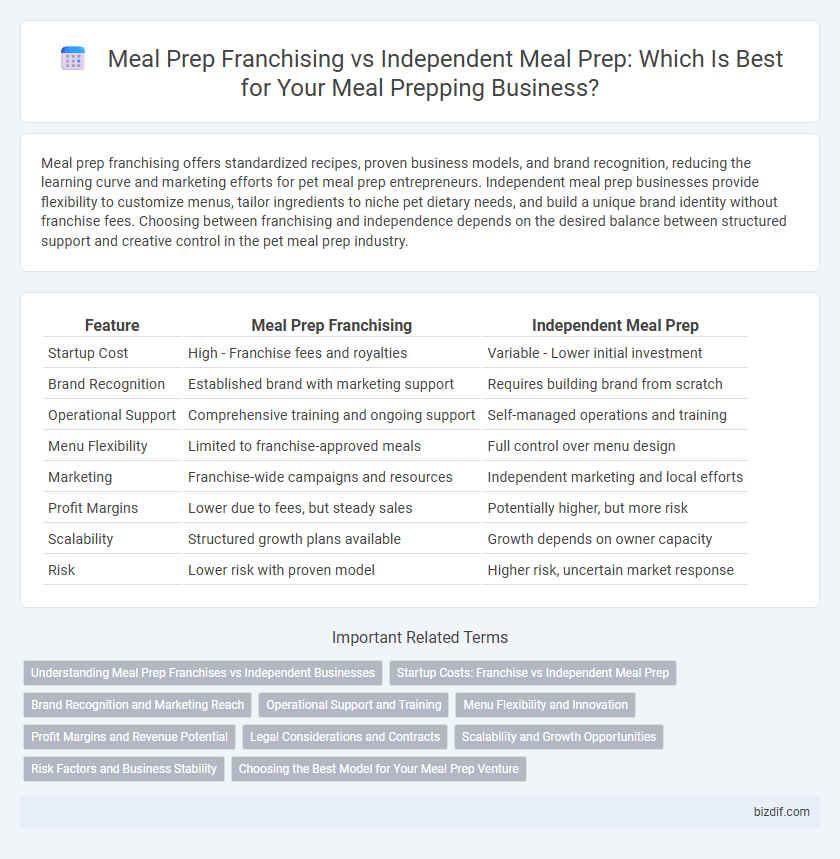Meal prep franchising offers standardized recipes, proven business models, and brand recognition, reducing the learning curve and marketing efforts for pet meal prep entrepreneurs. Independent meal prep businesses provide flexibility to customize menus, tailor ingredients to niche pet dietary needs, and build a unique brand identity without franchise fees. Choosing between franchising and independence depends on the desired balance between structured support and creative control in the pet meal prep industry.
Table of Comparison
| Feature | Meal Prep Franchising | Independent Meal Prep |
|---|---|---|
| Startup Cost | High - Franchise fees and royalties | Variable - Lower initial investment |
| Brand Recognition | Established brand with marketing support | Requires building brand from scratch |
| Operational Support | Comprehensive training and ongoing support | Self-managed operations and training |
| Menu Flexibility | Limited to franchise-approved meals | Full control over menu design |
| Marketing | Franchise-wide campaigns and resources | Independent marketing and local efforts |
| Profit Margins | Lower due to fees, but steady sales | Potentially higher, but more risk |
| Scalability | Structured growth plans available | Growth depends on owner capacity |
| Risk | Lower risk with proven model | Higher risk, uncertain market response |
Understanding Meal Prep Franchises vs Independent Businesses
Meal prep franchises offer standardized branding, proven business models, and centralized marketing support, enabling faster growth compared to independent meal prep businesses. Independent meal prep companies enjoy greater flexibility in menu customization, ingredient sourcing, and pricing strategies that cater to local market preferences. Evaluating franchise fees, operational autonomy, and scalability potential is crucial when choosing between a meal prep franchise and an independent meal prep startup.
Startup Costs: Franchise vs Independent Meal Prep
Startup costs for meal prep franchising typically range from $50,000 to $200,000, covering franchise fees, branded equipment, and initial inventory, providing a turnkey business model with established brand recognition. Independent meal prep businesses often require significantly lower upfront investment, around $5,000 to $30,000, focusing expenses on kitchen equipment, ingredients, and marketing, allowing greater flexibility but higher risk. Franchise opportunities offer structured support and established customer bases, whereas independent ventures demand strong self-management and brand-building efforts.
Brand Recognition and Marketing Reach
Meal prep franchising offers established brand recognition and extensive marketing reach, leveraging proven marketing strategies and nationwide campaigns to attract a broader customer base. Independent meal prep businesses face challenges in building brand identity and require significant effort to develop effective marketing, often relying on local or social media outreach. Franchises benefit from consistent branding and corporate support, which can accelerate customer trust and market penetration compared to standalone operations.
Operational Support and Training
Meal prep franchising offers comprehensive operational support and structured training programs that ensure consistency and efficiency across all locations. Independent meal prep entrepreneurs often face challenges in developing streamlined processes without access to established training resources. Franchise models provide ongoing guidance in supply chain management, quality control, and marketing strategies, which are critical for scaling and sustaining business growth.
Menu Flexibility and Innovation
Meal prep franchising offers standardized menus with limited flexibility, ensuring consistent quality but restricting customization and innovation. Independent meal prep businesses provide greater menu flexibility, allowing for tailored options and rapid incorporation of new dietary trends or customer preferences. This agility enables independents to innovate more freely, adapting quickly to market demands and emerging nutritional research.
Profit Margins and Revenue Potential
Meal prep franchising offers higher profit margins through established brand recognition, streamlined supply chains, and bulk purchasing power, leading to more predictable revenue streams. Independent meal prep businesses may face lower margins due to higher operational costs and marketing expenses but have greater flexibility to customize menus and pricing strategies, potentially capturing niche markets. Revenue potential in franchising tends to be more scalable with brand support, while independent operators can maximize profits by targeting local demand and unique dietary trends.
Legal Considerations and Contracts
Meal prep franchising requires adherence to stringent legal frameworks, including franchise agreements, intellectual property licenses, and ongoing compliance with franchisor standards, ensuring brand consistency and operational support. Independent meal prep businesses face fewer regulatory constraints but must navigate local health codes, food safety regulations, and contract negotiations with suppliers and clients independently. Contractually, franchises involve binding franchise disclosure documents and royalty clauses, while independent operators focus on custom agreements tailored to specific business needs and client relationships.
Scalability and Growth Opportunities
Meal prep franchising offers proven systems, established brand recognition, and marketing support, enabling faster scalability and access to larger markets compared to independent meal prep businesses. Independent meal prep ventures provide greater flexibility in menu customization and operational control but often face slower growth and limited resources for expansion. Franchise models leverage economies of scale and streamlined processes that facilitate rapid growth and consistent quality across multiple locations.
Risk Factors and Business Stability
Meal prep franchising offers structured business models, established brand recognition, and support systems that mitigate risk factors associated with market entry and operational challenges. Independent meal prep businesses face higher volatility due to the need for self-driven marketing, supply chain management, and customer acquisition, increasing exposure to financial instability. Franchise models typically provide scalable growth potential and more predictable revenue streams, contributing to greater long-term business stability compared to solo ventures.
Choosing the Best Model for Your Meal Prep Venture
Choosing between a meal prep franchise and starting an independent meal prep business hinges on your goals, resources, and desired level of control. Franchise models offer established branding, proven systems, and marketing support, which can reduce initial risks and accelerate growth. Independent meal prep ventures provide greater flexibility to innovate and tailor menus, but require more effort in building brand recognition and operational processes from scratch.
Meal prep franchising vs independent meal prep Infographic

 bizdif.com
bizdif.com